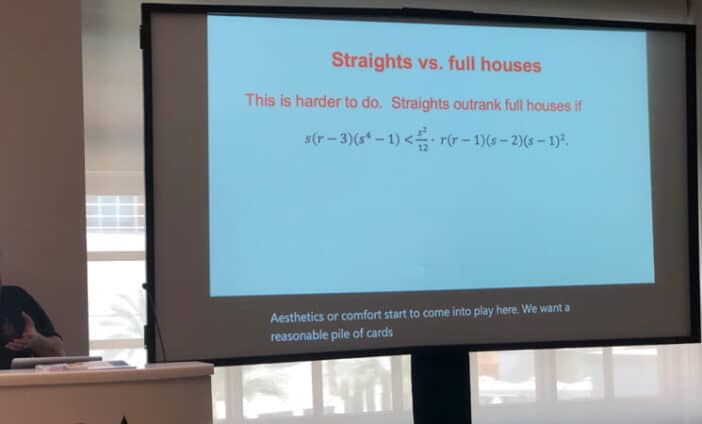The National’s new song, “Your Mind Is Not Your Friend,” states very plainly, in its title, what a significant amount of humans, and possibly even cats, grapple with each day.
(It should be said, however, that Phoebe Bridgers’ harmonies on this particular tune make it very clear that your ears, unlike your mind, are your friends. Her decision to go high on the world “child” in the final chorus nearly moves me to tears.)
“Your Mind Is Not Your Friend” has little to do with intellect, and everything to do with emotion and imagination and the places your brain wanders against your will. My mind was not my friend on Thursday morning, but I knew heading in that this would be the case.
Scroll up and check out the lead image. It contains an extremely complicated math formula. If I had a year to spare, I could possibly get my head around this one formula. The same goes for poker and all its permutations.
But I don’t have a year to spare, and I’m a semi-pro writer, and while I got good grades in math, it always took a lot longer than it should have, so I gave it up.
Yet on the flight to Vegas Monday night, I knew I would need to face the demon once again.
The dummy variable
Albion College is my wife’s alma mater. She attended Michigan State for a year. Big schools weren’t for her, but tiny Albion was. The only downside was the student loans. Too bad Uncle Joe wasn’t president back then.
Mark Bollman is a professor of mathematics at Albion. He has a wonderfully bush beard befitting of a Michigander and dares to tell math jokes. I put him on the spot at the end of his talk at the the 18th International Conference On Gambling & Risk Taking in Las Vegas on Thursday morning. I asked him to tell his favorite math joke. He stood awkwardly flustered for a full minute before delivering a zinger for the ages.
“Often, if we’re integrating with a variable upper limit, we say we’re gonna change the variable to a dummy variable. These being politically correct times, we don’t say dummy variable anymore. We say it’s variably challenged.”
Professor Bollman is responsible for the slide depicted in the lead image, the slide I will never understand. But know this: In some form of poker, given the right set of circumstances, a straight beats a full house. A trusted colleague of mine who wrote a whole book about poker was 99% sure the title of Bollman’s presentation (“When Does a Straight Beat a Full House?”) was tongue in cheek. That trusted colleague was wrong.
Then again, this entire conference has taught me to question any and all assumptions about gambling. Think (a little vino would be) Keno is purely a game of chance? Christopher Ingrassia of Kingsborough Community College knows better. What about a video poker game called Mega Jacks? The way Tristan Barnett of Flinders University in Australia explains it, it might as well be called Mega Bucks if you pump the right algorithm into your computer and let it slowly accumulate money as you sleep.
These people are absolutely brilliant, and I’m not. Most of us aren’t, and that’s why a mental “Yield” sign should give us pause every time we approach a roulette table.
But it’s nice to know someone’s got the system beat. It’s called the human race for a reason. Most of us lose, but someone wins. That’s the ultimate dummy variable right there.
Photo: Mike Seely





